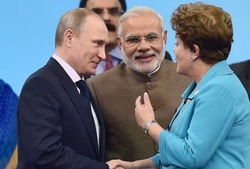
FORTALEZA, (BRAZIL) - Leaders of the BRICS group of emerging powers on July 15 created a Shanghai-based development bank and a reserve fund seen as counterweights to Western-led financial institutions. To ease worries of any nation getting more power than the other, BRICS leaders agreed to put the bank’s headquarters in Shanghai. The first president will be Indian while the first board chair will hail from Brazil.

The leaders of Brazil, Russia, India, China and South Africa agreed to launch the institutions to finance infrastructure projects and head off future economic crises. “These initiatives show that, despite our diversity, our countries are committed to a solid and productive association,” Brazilian President Dilma Rousseff said at a summit in the northeastern seaside city of Fortaleza.
Russian President Vladimir Putin hailed the agreements as “a very powerful way to prevent new economic difficulties.”
The five emerging nations first unveiled their plans last year. The New Development Bank aims to rival the Washington-based World Bank while the reserve is seen as a “mini-IMF.” BRICS leaders have pressed for reform of the International Monetary Fund to give developing countries more voting rights. “The IMF urgently needs to review its distribution of voting power in order to reflect the unquestionable weight of emerging countries,” Rousseff said.
The development bank will have initial capital of $50 billion that could rise to $100 billion, funded equally by each nation. An Africa Regional Centre will be based in South Africa. The bank will help emerging and developing nations mobilize resources for infrastructure and sustainable development projects, the summit declaration said. The Contingent Reserve Arrangement will have $100 billion at its disposal to head off potential economic volatility linked to the United States exiting its stimulus policy.
China is expected to make the biggest contribution, $41 billion, followed by $18 billion each from Brazil, India and Russia and $5 billion from South Africa. The summit comes as the economies of some BRICS countries, which together represent 40 per cent of the world population and a fifth of the global economy, are cooling down, with Russia and Brazil expecting just one per cent growth this year. Experts say the new bank and fund will give the group the backbone of a formal organization.
Russian President Vladimir Putin hailed the agreements as “a very powerful way to prevent new economic difficulties.”
The five emerging nations first unveiled their plans last year. The New Development Bank aims to rival the Washington-based World Bank while the reserve is seen as a “mini-IMF.” BRICS leaders have pressed for reform of the International Monetary Fund to give developing countries more voting rights. “The IMF urgently needs to review its distribution of voting power in order to reflect the unquestionable weight of emerging countries,” Rousseff said.
The development bank will have initial capital of $50 billion that could rise to $100 billion, funded equally by each nation. An Africa Regional Centre will be based in South Africa. The bank will help emerging and developing nations mobilize resources for infrastructure and sustainable development projects, the summit declaration said. The Contingent Reserve Arrangement will have $100 billion at its disposal to head off potential economic volatility linked to the United States exiting its stimulus policy.
China is expected to make the biggest contribution, $41 billion, followed by $18 billion each from Brazil, India and Russia and $5 billion from South Africa. The summit comes as the economies of some BRICS countries, which together represent 40 per cent of the world population and a fifth of the global economy, are cooling down, with Russia and Brazil expecting just one per cent growth this year. Experts say the new bank and fund will give the group the backbone of a formal organization.

 RSS Feed
RSS Feed
